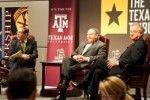Texas A&M was the site of The Texas Tribune Festivals On the Road series Thursday as University officials, journalism professionals and higher education experts discussed major topics surrounding higher education.
In addition to welcoming distinguished members of Texas A&M administration A&M President R. Bowin Loftin and System Chancellor John Sharp Texas senators and other university presidents were guests at the Annenberg Presidential Center to discuss the current development of Texas universities.
They tackled some of the major issues that are facing higher education today, said Jason Cook, A&M vice president of marketing and communications. They looked at issues like funding, graduation rates and technology. It was great to get all of these leaders together.
Texas A&M has partnered with The Texas Tribune for almost two years for events similar to this one.
The Texas Tribune has become a new media outlet that is totally electronic-based, Cook said. And they dove deep into significant issues facing the state of Texas.
The Texas Tribune is a nonprofit digital news organization that works with policy, special news and events surrounding public policy in Texas.
The symposium featured panel discussions of distinguished Texas leaders who talked about topics such as pathways to student success, the value of a college education, innovations in online learning and the legislative side of higher education.
In the last session of the day titled Innovations in Online Learning, Evan Smith, CEO and editor-in-chief of The Texas Tribune, picked the brains of leading educational figures in Texas concerning the role that technology is beginning to play in education specifically through Massive Open Online Courses.
We now have it within our power to give every student in Texas an elite caliber education, said Steven Mintz, director of the Institute for Transformational Learning at the University of Texas at Austin. And you can pay $0 for some programs.
Mintz and other panel members described the modern technology, which provides education to individuals who would otherwise remain uneducated.
Smith said students who would likely use these programs are naturally tech-savvy.
Students come into classes almost with USB cords in their heads, Smith said.
Many of the issues addressed at the event overlap directly with matters involving A&M.
Having The Texas Tribune and their editor Evan Smith in campus says a lot about the role that Texas A&M has in shaping the higher education in Texas, Cook said. Texas A&M is obviously at the center of these issues.
The Texas legislation will soon take up similar conversations as the ones presented at the symposium.
I think that the most significant topic for us is to look at funding and to look at the partnership that exists between state appropriations, what students pay in fees, and philanthropic support, Cook said. It was a perfect timing to discuss all of these issues, because these are the same issues that the legislation will be addressing [in January].
Greater than the individual topics themselves, Texas task today is to address how the issues are tied together.
One thing people should realize is that there are many different pressures and forces that are impacting higher education today, Cook said. Its not just about funding, access, technology but all of these conversations we addressed [at the symposium] packaged together as one.
Cook said it is important to look at how higher education can be a solution to difficulties that our state is facing right now, specifically to that of shifting demographics.
With the changing demographics, we as one of the state land grant universities have a responsibility to serve the citizens of Texas, Cook said. And that includes serving the changing demographics as well.
Karyssa Zavala, senior agricultural communications and journalism major, explained how the changes in demographics really hit home with her.
I am a Hispanic student, and they spoke a lot about first-generation students, Zavala said. Im not a first-generation student, but I am the first in my family to graduate from a four-year institution.
After working with a congressman who represented South Texas, Zavala saw the significant rise in Hispanic demographics.
There has been a lot of discussion about that today, Zavala said. I found it really enlightening because its not really spoken of. Its definitely an issue, especially in the education world.
Zavala also experienced the ups and downs of the Universitys funding first hand, through her undergraduate experience with scholarships.
When I came [to A&M], I had a lot of scholarships. And now with the budget cuts, the financial aid has been detrimentally affected, Zavala said. [The panel] has discussed how Texas institutions want to prepare students to give back to the economy and how the legislature in DC is going to have to demand funds for education. To have a work force, you have to have people graduating and getting degrees.
Symposium focuses on funding, graduation rates, technology
November 30, 2012

0
Donate to The Battalion
$2065
$5000
Contributed
Our Goal
Your donation will support the student journalists of Texas A&M University - College Station. Your contribution will allow us to purchase equipment and cover our annual website hosting costs, in addition to paying freelance staffers for their work, travel costs for coverage and more!
More to Discover








